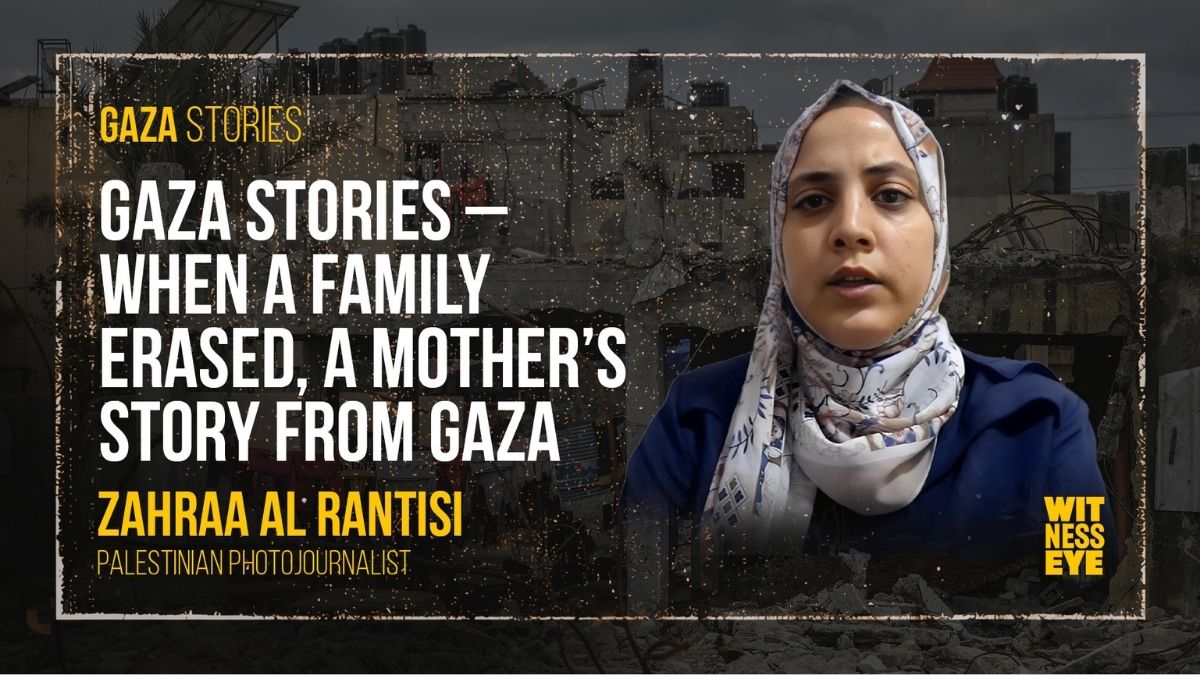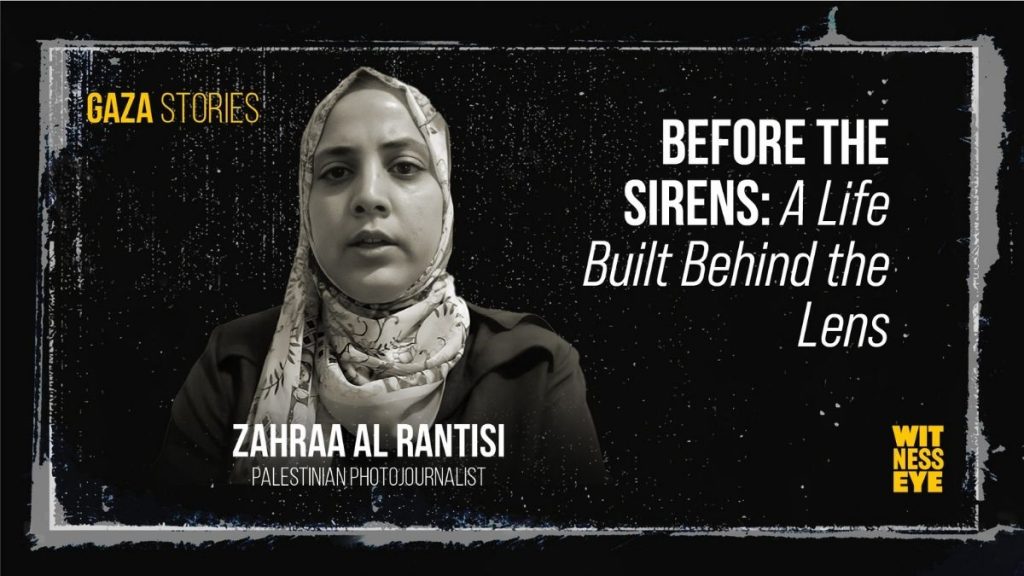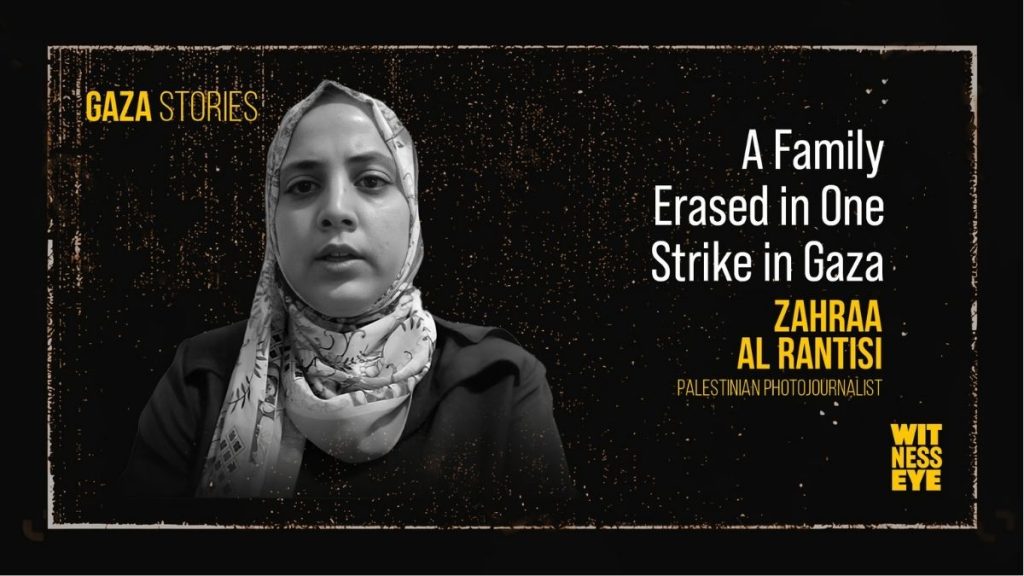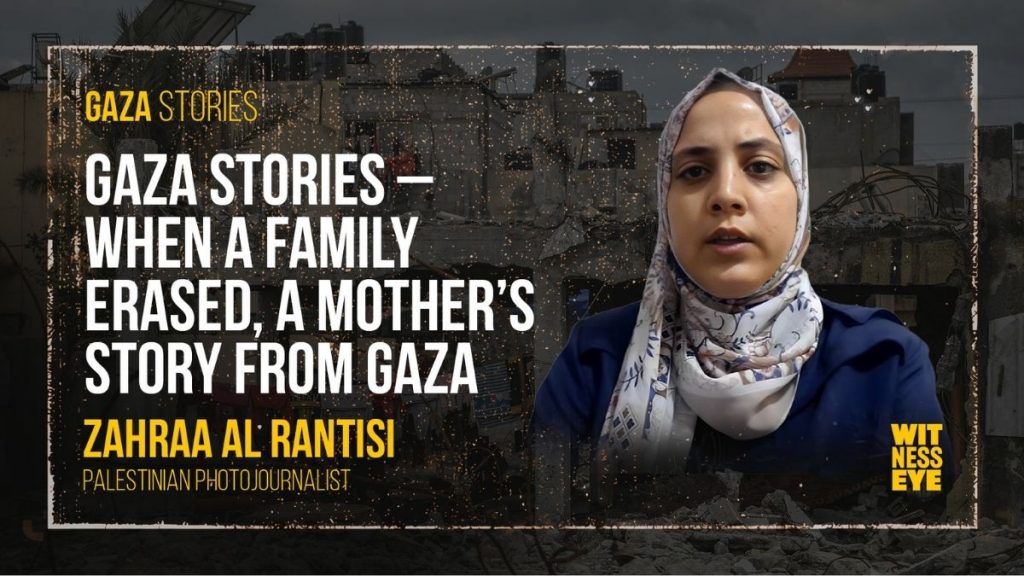
The streets that raised her are now a map of absences. In these Gaza stories, names become coordinates, homes become dates, and a life splits into a before and an after. Zahra Al-Rantisi remembers both with painful precision. Before October 7, she was behind the camera—filming for local outlets, collecting certificates, learning to turn light and angle into narrative. After October 7, the frame narrowed to rubble, burns, fractures, and two small girls who still ask for their father
“On the third day of the war—10/10—our building was hit with five missiles. I was beside my husband. Our newborn, Masa, was in my belly; she was just thirty-nine days old. I woke up under the rubble.”
This is not a metaphor; it is the unvarnished core of Zahra’s account. Her husband died that night, as did nine members of his family—uncles, aunts, grandparents. She survived with fractures and burns. Her older daughter, Misk, crawled out of a childhood and straight into grief. Her baby, Masa, survived by a coincidence of hands that found her in the dark.

Before the Sirens: A Life Built Behind the Lens
Zahra introduces herself the way résumés are written, as if reciting that other life could pull it closer: Zahra Amira Abdul Rahman Al-Rantisi, degree in Islamic Education from the Islamic University, then media studies, then a “media shield” for excellence. She learned the steady craft of permanent filming—long assignments, repeated coverage, the patience and stamina that good journalism requires.
It matters that she says “by God’s grace” when she lists what she achieved, because the cadence of gratitude is the drumbeat under ordinary Gazan life, you study, you work, you help, you say alhamdulillah. It matters because the contrast with after is so brutal.
The Night of Five Missiles
She remembers time precisely: 9:00 p.m. She remembers the seating: husband to her side, Misk curled on his lap for a quick evening visit, Masa—thirty-nine days old—asleep on her mother’s abdomen after a C-section barely healed.
The rest she learned in fragments: five missiles, four floors, a building of civilian families. Glass, dust, a wall collapsing into a timber that wedged her body in place. She heard Masa’s cry, then she didn’t. In the space between those sounds, Zahra assumed she had lost her baby.
“I stayed under the debris for more than an hour. When they pulled me out, I wasn’t conscious from the pain.”
The scene is too large for a single image, so she offers small ones: the way a huge wall leaned on a massive beam, the rescuers’ hands trying to lift without breaking, the shock that is louder than noise.

A Family Erased in One Strike in Gaza
Nine names are now a plural—“the martyrs”—but Zahra keeps the relationships sharp: her daughters lost their father, their uncles and aunts, their grandfather and grandmother. Every family member who might have stepped into the father’s place is gone too. That is the math of disappearance.
The grief shows up in children’s questions. Misk is three and a half now. She remembers what she shouldn’t have had to. She asks for her father in the middle of play; she asks her mother’s friends to explain why they have fathers and she doesn’t.
“I try to teach the baby to say ‘mama.’ She says ‘baba’ instead—always ‘baba.’ As if she knows the one she can’t see has a claim on her first word.”
There are moments Zahra forgets the finality—catching a glimpse of a woman in a crowd, running to greet her as “Hadeel, my husband’s sister”, then remembering Hadeel was among the nine. This is how grief behaves: it leaves enough memory to call out a name and enough reality to break your heart for calling.
The Weight of Exile: Fractures, Burns, and a Pram
Egypt means food, a bed, and antibiotics—and Zahra says that with humility, knowing many wounded in Gaza have none of the three. But exile also means hospital corridors for a year, learning to walk again while balancing diapers and grief and state paperwork. She is a single mother with two daughters and an injured leg that kept her down for months.
“You live all kinds of pain at once—loss, weakness, illness, distance, exile. You want someone to care for you, but you are the one who has to care for your girls.”
She describes nights that do not end, the kind where analgesics dull the bone pain but not the ache of absence, also describes how strangers in Egypt turned into a patchwork family—friends who sleep over so Misk can pretend she has aunts again, women who answer to “khala” because a child needed the word to mean someone living.

The Missing and the Dead by Torture: A Brother Without a Trace, an Uncle Announced Months Later
Pain doesn’t keep a proper queue. While Zahra learned to stand again, her brother Abdul Rahman disappeared. He stepped out to buy bread and didn’t come back. The family checked prisoner lists—no name. They called offices—no answers. In Gaza stories, this is a recurring page: Gaza’s Missing is both a phrase and a wound.
Then there is Dr. Iyad Al-Rantisi, Zahra’s uncle—a gynecologist and obstetrician—detained, tortured, and killed in custody, she says, while moving from north to south along what the army called a “safe corridor.” The family saw him taken; seven months later came the announcement of his death.
Zahra speaks without legalese, but her details trace the grammar of International Humanitarian Law and Crimes Against Humanity: the Destruction of Civilian Infrastructure, the targeting of medical personnel, the separation of families at checkpoints, and the death in detention. Her account belongs beside Eyewitness Testimonies, Civilian Impact Reports, and whatever Forensic Investigations and Digital Evidence Archives may come to hold—material that future Gaza Tribunal Reports and Gaza legal review processes may examine.
39.000 Orphans
Zahra names a number almost too large to place: “39,000 orphans,” children who lost a father, a mother, or both. She has knocked on dozens of doors seeking orphan sponsorship—over forty organizations, she says—and learned how aid can fracture along borders: “You must be in Gaza.” What kind of logic demands a child return to a war zone to qualify for help?
Support, when it comes, is often conditional or temporary. But needs are not: rent, food, school, psychological care, a family atmosphere that can’t be faked. Misk lights up when friends visit and calls them “auntie” because the language of kinship steadies her. Then the friend goes home and the apartment sounds too large again.
Working Under the Crosshairs: When a Camera Is Treated Like a Weapon in Gaza
Zahra once lived behind the lens; she knows what it takes to hold a frame steady while the world moves. She also knows how the job changed: more than 200 journalists killed, many more injured or detained.
“The occupation considers the camera a weapon stronger than bullets. It hates those who film the crimes because the image shows their brutality. So it tries to eliminate the lens.”
For journalists, she says, the price is explicit; you raise the camera knowing it may cost you your life.
Yet people still film, still upload Social Media Evidence, still add to the Witness Eye ecosystems that preserve a record when formal pathways are blocked. These images may flow later into Civilian Casualty Mapping or War Crimes Documentation, and—if the world’s institutions function—into Legal Accountability Cases. Until then, they hold the only courts many families will see: public conscience.
A Question for the Court and International Justice for Gaza
Asked what she would say if given the floor at The Hague, Zahra doesn’t rehearse a timeline. She asks a question that is both simple and devastating:
“Why did they establish human rights headquarters, and why did they establish international justice headquarters—if they only watch us in silence?”
She wants bodies returned for burial, answers to disappearances, waterfall of blood to stop. These are modest asks in a moral universe; they feel enormous only because the systems designed to answer them have paused.
The Many Weapons After the Bomb: Cold, Hunger, Fear in Gaza
Zahra names the secondary weapons that continue after the blast: trauma, hunger, exile, bureaucracy that separates families, and the long, unacknowledged labor of single mothers raising children with invisible wounds. She’s seen doctors who cannot unsee what they saw, and mothers whose pregnancies failed for lack of nutrition, calm, or care.
Her list reads like an index for human rights violations in Gaza: blocked medical transfers, restrictions on companions, detention without disclosure, attacks on hospitals, suffocating siege economics. Each item is a future footnote for international justice, but for now it is a daily bill her family must pay in new currency—time, tears, sleeplessness.
What Justice Might Feel Like for Zahra
Zahra believes in a justice that outlives this moment. She locates it in faith, yes, but also in method—in assembling Gaza testimonies with timestamps and coordinates, in Gaza Tribunal hearings that one day read her husband’s name into the record, in Gaza justice that is less a slogan than a sequence: witness, record, submit, insist.
Until then, she will raise two girls who know their father’s kindness not from memory but from their mother’s voice. She will teach them that he was there when Misk fell asleep in his lap, that he looked down and smiled at Masa the week she was born, that he held both of them in a living room where the night was ordinary—until it wasn’t.
“Family is safety,” she says. “You can’t forget your family overnight.”
Closing: The Lens, the Names, and the Next Morning with the Hopes for Gaza
Gaza stories are often told in the plural—casualty numbers, destroyed blocks, displaced totals—but Zahra’s account pulls us back to the singular: a guaranteed bedtime that became a siren, a mother teaching ‘mama’ to a baby who answers ‘baba’, a child who beams when a friend sleeps over because it feels like having an aunt.
This narrative belongs to the living archive that survivors keep building, the evidence the world will either honor or ignore. If there is a Gaza Tribunal worthy of the name, it will make space for this tenor of detail; if there is international justice, it will treat her testimony as more than pain—it will treat it as proof.
Zahra Al-Rantisi’s story is a powerful testament to the human cost of war, where loss is measured in intimate moments and unspoken grief. Her testimony not only demands justice but serves as a call for the world to see beyond the numbers, recognizing the enduring strength of survivors like her. Despite unimaginable loss, Zahra’s resilience ensures that her family’s story—and the fight for justice—will endure. Now, hear it directly from Zahra Al-Rantisi—survivor, mother, journalist, witness, and keeper of untold stories, whose strength transcends loss and whose voice demands justice.
Stay Connected with Witness Eye
Follow us on our official channels:
